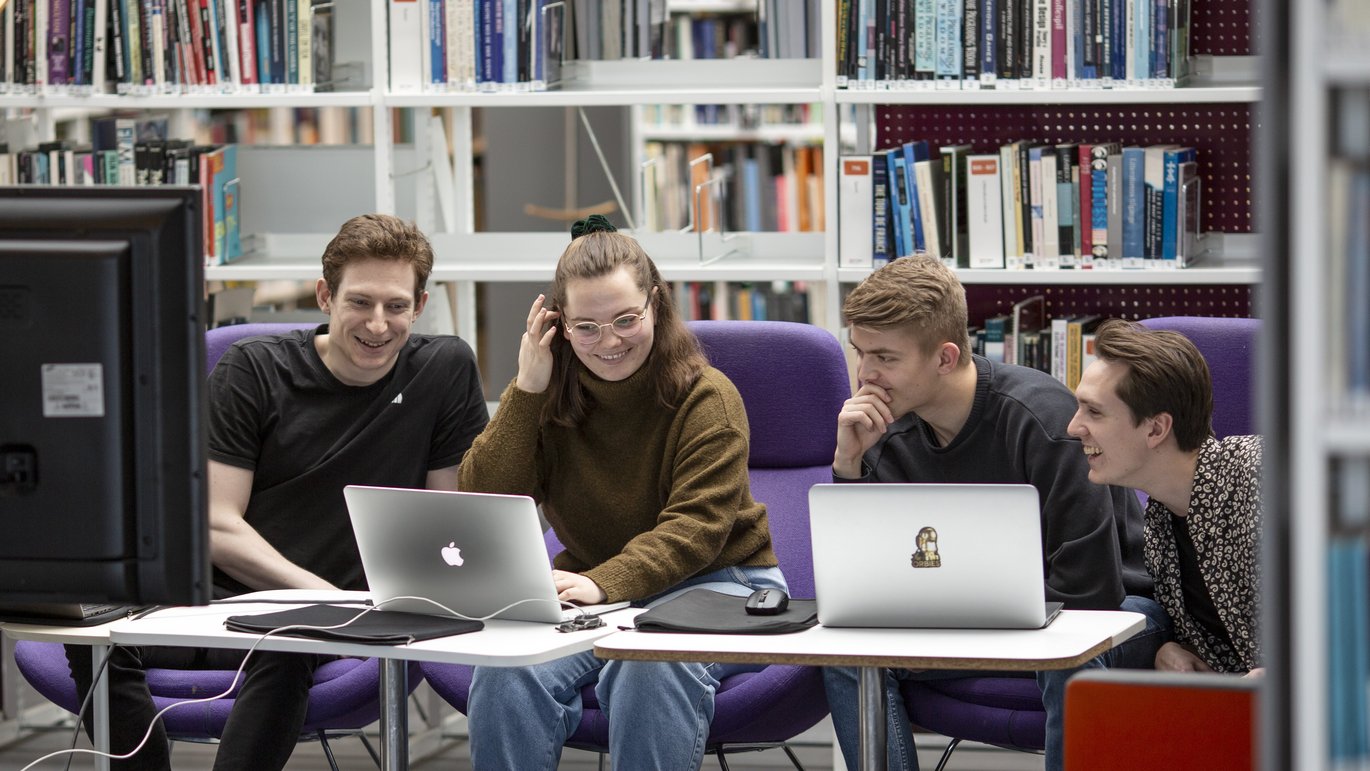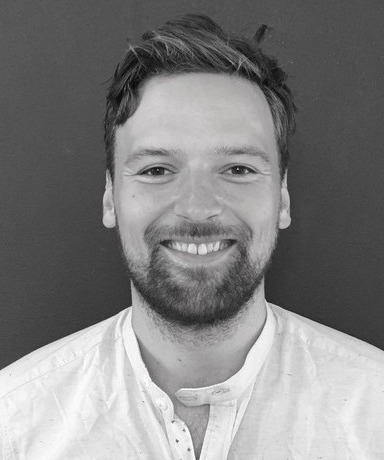Examining study group dynamics at the Department of Computer Science
Together with the Department of Computer Science, the CED have examined the use of study groups in the department's degree programmes, which have a long and inherited culture of using study groups as working communities. The report reveals the complexities and dilemmas of working in study groups and presents five recommendations for how the department can further develop their study group dynamics.



As part of the retention strategy at the Faculty of Natural Sciences, the faculty's Student Retention Forum has discussed how the degree programmes manages study groups and how study group initiatives are evaluated. In connection with this, they wanted to share inspiration and experiences across the faculty. The Department of Computer Science became the starting point for knowledge sharing as the department has a long history of using study groups.
At the Department of Computer Science, they decided to launch a series of qualitative studies and get an outsider’s perspective on the norms and group dynamics of their degree programmes in Computer Science and IT Product Development.
The focus of the study was how the students use their groups and what purpose the students believe the study groups have. In addition, they wanted to investigate how the groups are formed and how study groups might strengthen the students’ academic and social integration.
“A quantitative study would just give us answers to things we already knew. Instead, we wanted to dig deeper. But there are a lot of blind spots when investigating yourself. Hence, we decided to contact the CED,” Andreas Birch Olsen says. He is an education advisor at the Department of Computer Science.
In connection with the examination, the CED made observational studies of group formation and focus group interviews. In the end, they held workshops based on the insights from the observations and interviews.
“We wanted to do a study that was as close to the students’ practice and voices as possible. An explorative approach,” Educational Consultant Simon Raaby Holmgaard Poulsen from the CED says. He was at the head of the study.
An inherited culture of study groups as working communities
The Department of Computer Science have worked systematically with study groups on their degree programmes for several years. The work in the study groups is based on assignments and is embedded in the actual programme structure. Thus, collaborative learning has always been an established practice:
“The group work goes back to the ‘old days’ when they did not have enough computers for all students. Thus, they had to share and learn in groups. This means that there is an almost inherited culture in relation to study groups,” Andreas Birch Olsen says.
Among other things, the results from the study at the Department of Computer Science showed that the students have a clear distinction between private relations and collaboration in study groups, which they consider as a working community. In general, the social aspect is not an integral part of the study groups.
There is a large amount of material and tasks on the department's degree programmes with many assignments. According to the student respondents, it is therefore essential to produce assignments together with the study group as they thereby can delegate the work. The students describe this as more or less expedient. Sometimes they feel they miss out on deep learning and academic insight.
However, in relation to group dynamics, Simon Raaby Holmgaard Poulsen does not view the joint assignments as exclusively negative:
“The students view the purpose of the study groups to be all about doing assignments. During their studies, they have to do two assignments each week with their programming partner, and they may have two or three courses at the same time with this similar structure. So, it is moving fast. Therefore, the students clearly distinguish between private social relations and collaborating in study groups as a working community. It is not about who likes whom,” he explains.
In the study, the students mention that they quickly learn to implement their knowledge in practice because they are ‘positively forced’ to work together.
“Since the collaboration revolves around assignments, the focus is on the academic collaboration on the assignment, which the students find fruitful and educational,” Simon Raaby Holmgaard Poulsen elaborates.
The students’ dilemma
According to Simon Raaby Holmgaard Poulsen, to understand the Department of Computer Science’s approach to study groups, it is important to know how the department works with groups:
“At the Department of Computer Science, the purpose, tasks, and size of the study groups are defined by the individual course. In the first semester, the students are put into programming pairs by the student advisers who spend a lot of time on matching the students. Many of the students consider their programming partner as a study group. Later on in their studies, they will be working in groups of two, three, or four, but their programming partner from the first semester often joins the new group constellations.”
Overall, Simon Raaby Holmgaard Poulsen's interviews at the Department of Computer Science showed that many of the students wish to develop their competencies within group work. They talk about group work as something they need to be good at entering into when they finish their studies and enter the labour market. In the interviews, several of the students also indicated that they would like to learn to work in different forms of collaboration with changing study groups.
At the same time, their dilemma is that the students generally prefer only working together with their regular programming partner. Alternatively, they may set up study groups in which they are sure to work together with their programming partner and students they already know. In addition, the students explain that the work becomes more flexible when they know one another well, which makes it easier to cope with the many assignments.
It is this dilemma, between varying study groups or one fixed programming partner that the students and the department face when establishing and working with study groups.
“The students at the Department of Computer Science are aware of the dilemma; They understand the purpose of trying out different groups, but they also find it difficult. To succeed in their studies, they strategically choose what they think will help them the best. By choosing to only work with your regular and well-known programming partner, it is easier to succeed and ensure the best possible performance. It is quite natural. Therefore, it is difficult to comply with what the students want because sometimes they want something that can also be frustrating for them to receive,” Simon Raaby Holmgaard Poulsen explains.
Five recommendations
Based on his study at the Department of Computer Science, Simon Raaby Holmgaard Poulsen has presented five recommendations for how the department can continue its work with study groups.
The recommendations are based on interview data from students and are thematic development proposals for further work with study groups. They deal partly with the establishment and structure of groups (recommendations A to C) and partly with the educational use of groups and study groups (D to E):
Recommendation A
It is recommended that the department develop its own practice-based guidelines and tips on collaboration in study groups at the Department of Computer Science. Contextualised techniques and guides can help students feel more prepared to work in new groups. In case of conflicts or emergencies within the group, it can also be beneficial to have practice-based guidelines to refer to.
Recommendation B
It is recommended that the department use another process for establishing study groups in the first semester. A new process must be clearly communicated to the students so they understand it and can see the point of it. For example, the process could be:
- groups are set up administratively at the beginning of the semester.
- student advisers help students get to know one another in groups.
- halfway through the semester, the groups are systematically evaluated, and new groups are established if needed.
Recommendation C
It is recommended that principles for the combination and operation of study groups are developed at each degree programme to ensure consistency across classes and the individual semesters.
For example, the principles can describe:
- who is responsible for organising and creating groups (e.g., the lecturer, mentor, student adviser, the students themselves, or the administration)
- how the combination of groups should be (e.g., at random, through a questionnaire, or personality test)
- how large the groups should or can be (e.g., fixed or flexible group sizes)
- what is the group’s task, purpose, or assignment (e.g. doing submissions, writing assignments, discussing texts, or helping one another with study techniques)
- guidelines for what happens when conflicts arise in the groups and how they can be handled.
Recommendation D
It is recommended that the department create several forms of group work, clearly stating the purpose of each group format. They can do both more fixed group structures and more changing and flexible group sizes.
Recommendation E
It is recommended that the department carry out a content analysis of the teaching material and workload in all courses to avoid that the study groups do undesirable delegation of tasks, which can result in a lack of in-depth learning.
The work ahead
In connection with the work on recommendations A and B, more time has been freed up for the department’s student advisers. By putting together the groups administratively, the student advisers no longer have to spend a lot of time on the combination of groups. Consequently, some study group exercises, which they previously used, have been ditched as they turned out not to be adapted to the actual practices of the programme.
Instead, various more practical and relevant exercises and instructions initiated by the student advisers have been implemented to help the students get ready to work in groups. Among other things, the student advisers now spend more time with the new students on conversations about how to work together in pairs or groups, dealing with expectations and challenges, and work planning.
About the work regarding recommendation B, Andreas Birch Olsen says:
"First things first, we decided to deal with the low-hanging fruits. For example, previously we put together groups based on a survey. We have decided to scrap this because the students gave the survey much greater value than it actually had. They thought ‘This must be the most optimal partner for me because someone smarter than me has looked at my answers and found out who is the best fit for me.’ Thus, the students mistakenly thought that it was not okay to find new partners.”
Instead, at the start of the semester 2023, the department have tried putting together programming pairs and groups randomly and not by the student advisers. They still take into account whether the pairs and groups have the same level of programming experience, which previously was also a criterion used when dividing students into groups. That the process is like this and why, will be clearly communicated to the students as well.
In addition, later in the semester, they will get a chance to choose new programming partners and groups or continue with the existing ones. The student advisers inform the new students that they can contact the student instructors in the respective courses if they encounter problems in their programming pairs or project groups. The student instructor will then help the students make the groups function better.
“The new process has received positive feedback from the students and student advisers. Several student advisers and students say it is reassuring to know that the groups are not permanent. The students and the student adviser express that it is practical to always be able to switch if the groups are not working and that there is still plenty of time to explore the group collaboration in-depth,” Simon Raaby Holmgaard Poulsen says.
Based on Simon Raaby Holmgaard Poulsen’s report, the Department of Computer Science have become aware that further knowledge about how groups are used is needed. Therefore, local analyses of the degree programmes and their teaching will be initiated to analyse group sizes, structures, and functions. This will lead to a discussion in the faculty's Forum for Education about the use of study groups, which address recommendations D and E.
Read more about study groups
In addition to the interview and observation data, Simon Raaby Holmgaard Poulsen’s recommendations for the Department of Computer Science are based on other experiences from Aarhus University. Among other things, Senior Consultant Bente Kristiansen has examined the study group landscape at Aarhus University:
Do your local practices need servicing?
The CED offers competent consultancy regarding teaching and education.
If you are interested in consultancy, advice, or collaboration, you are always welcome to contact us for a non-committal talk.
